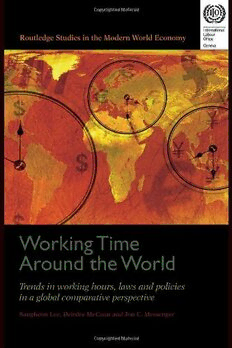
Working Time Around the World: Trends in Working Hours, Laws, and Policies in a Global Comparative Perspective PDF
239 Pages·2007·1.647 MB·English
Most books are stored in the elastic cloud where traffic is expensive. For this reason, we have a limit on daily download.
Preview Working Time Around the World: Trends in Working Hours, Laws, and Policies in a Global Comparative Perspective
Description:
John Maynard Keynes once made the bold prediction that the three-hour work day would prevail for his grandchildren's generation. Seventy years later, the question of working time is as pertinent as it was at the inception of the 40-hour week. Not until now, however, has there been a global comparative analysis of working time laws, policies and actual working hours. Despite a century-long optimism about reduced working hours and some progress in legal measures limiting working hours, this book demonstrates that differences in actual working hours between industrialized and developing countries remain considerable - without any clear sign of hours being reduced. This study aims to offer some suggestions about how this gap can begin to be closed. Lee, McCann and Messenger trace the theoretical background of the concept of working time before examining recent trends in working time laws in developing countries and countries in transition. The study then shifts its focus to developments in selected countries, considering both broad trends in working time at a national level and the structure and dynamics underlying these trends. The authors provide a remarkable set of policy suggestions that preserve health and safety, are 'family-friendly', promote gender equality, enhance productivity and facilitate workers' choice and influence over their working hours. This book will be of great interest to policy makers engaged with working conditions or health and safety, labour market experts, trade union leaders and workers' organizations, as well as academics and researchers in the fields of industrial relations, labour economics and labour law.
See more
The list of books you might like
Most books are stored in the elastic cloud where traffic is expensive. For this reason, we have a limit on daily download.
